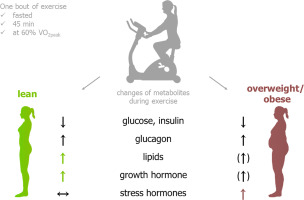当前位置:
X-MOL 学术
›
Metabolism
›
论文详情
Our official English website, www.x-mol.net, welcomes your
feedback! (Note: you will need to create a separate account there.)
Altered metabolic and hormonal responses to moderate exercise in overweight/obesity.
Metabolism ( IF 10.8 ) Pub Date : 2020-03-30 , DOI: 10.1016/j.metabol.2020.154219 Christina Gar 1 , Marietta Rottenkolber 1 , Michael Haenelt 2 , Anne L Potzel 1 , Stefanie Kern-Matschilles 1 , Cornelia Then 1 , Jochen Seissler 1 , Martin Bidlingmaier 2 , Andreas Lechner 1
Metabolism ( IF 10.8 ) Pub Date : 2020-03-30 , DOI: 10.1016/j.metabol.2020.154219 Christina Gar 1 , Marietta Rottenkolber 1 , Michael Haenelt 2 , Anne L Potzel 1 , Stefanie Kern-Matschilles 1 , Cornelia Then 1 , Jochen Seissler 1 , Martin Bidlingmaier 2 , Andreas Lechner 1
Affiliation

|
BACKGROUND
An adequate metabolic and hormonal response to the switch from rest to exercise is critical for the health benefits of exercise interventions. Previous work suggests that this response is impaired with overweight/obesity but the specific differences between overweight/obese and lean individuals remain unclear.
METHODS
We compared glucose and non-esterified fatty acid (NEFA) regulation and the changes of key homeostatic hormones during 45 min of moderate exercise between 17 overweight/obese and 28 lean premenopausal women. For this comparison, we implemented an exercise protocol at 60% of individual peak oxygen uptake, with frequent blood sampling and under fasting conditions.
RESULTS
We found that at the same exercise intensity in the overweight/obese and the lean group of women, the metabolic and hormonal response differed. In contrast to the lean group, the overweight/obese group portrayed an activation in the stress axis (adrenocorticotropic hormone (ACTH)/cortisol) and a lower growth hormone (hGH) response and exercise-increase of plasma NEFA. Both groups, however, displayed increased insulin sensitivity during exercise that was accompanied by a normalization of the elevated fasting glucose in the overweight/obese group after 15-20 min.
CONCLUSION
We conclude that the response to exercise in overweight/obese subjects indeed differs from that in lean individuals. Additionally, we demonstrate that exercise can elicit beneficial (improved glucose regulation) and unwanted effects (stress axis activation) in overweight/obese subjects at the same time. This second finding suggests that exercise interventions for overweight/obese subjects need careful consideration of intensity and dose in order to achieve the intended results and avoid acute, undesired reactions.
中文翻译:

对超重/肥胖症适度运动的代谢和激素反应改变。
背景技术对于从休息到运动的转变,适当的代谢和激素反应对于运动干预的健康益处至关重要。先前的工作表明,超重/肥胖会削弱这种反应,但超重/肥胖与瘦人之间的具体差异尚不清楚。方法我们比较了17名超重/肥胖与28名瘦身绝经前妇女在45分钟的中等运动中葡萄糖和非酯化脂肪酸(NEFA)的调节以及主要稳态激素的变化。为了进行比较,我们在每次峰值氧气摄入量的60%处实施了一项运动方案,并经常抽血并在禁食的条件下。结果我们发现,在超重/肥胖和瘦弱的女性运动强度相同的情况下,新陈代谢和激素反应也有所不同。与瘦弱的组相反,超重/肥胖组在应激轴(肾上腺皮质激素(ACTH)/皮质醇)的激活和较低的生长激素(hGH)反应以及血浆NEFA的运动增加方面表现出优势。然而,两组均显示出运动过程中胰岛素敏感性的增加,并伴随着15-20分钟后超重/肥胖组空腹血糖升高的正常化。结论我们得出结论,超重/肥胖受试者对运动的反应确实与瘦人不同。此外,我们证明运动可以同时引起超重/肥胖受试者的有益(改善葡萄糖调节)和不良作用(应力轴激活)。
更新日期:2020-03-31
中文翻译:

对超重/肥胖症适度运动的代谢和激素反应改变。
背景技术对于从休息到运动的转变,适当的代谢和激素反应对于运动干预的健康益处至关重要。先前的工作表明,超重/肥胖会削弱这种反应,但超重/肥胖与瘦人之间的具体差异尚不清楚。方法我们比较了17名超重/肥胖与28名瘦身绝经前妇女在45分钟的中等运动中葡萄糖和非酯化脂肪酸(NEFA)的调节以及主要稳态激素的变化。为了进行比较,我们在每次峰值氧气摄入量的60%处实施了一项运动方案,并经常抽血并在禁食的条件下。结果我们发现,在超重/肥胖和瘦弱的女性运动强度相同的情况下,新陈代谢和激素反应也有所不同。与瘦弱的组相反,超重/肥胖组在应激轴(肾上腺皮质激素(ACTH)/皮质醇)的激活和较低的生长激素(hGH)反应以及血浆NEFA的运动增加方面表现出优势。然而,两组均显示出运动过程中胰岛素敏感性的增加,并伴随着15-20分钟后超重/肥胖组空腹血糖升高的正常化。结论我们得出结论,超重/肥胖受试者对运动的反应确实与瘦人不同。此外,我们证明运动可以同时引起超重/肥胖受试者的有益(改善葡萄糖调节)和不良作用(应力轴激活)。











































 京公网安备 11010802027423号
京公网安备 11010802027423号